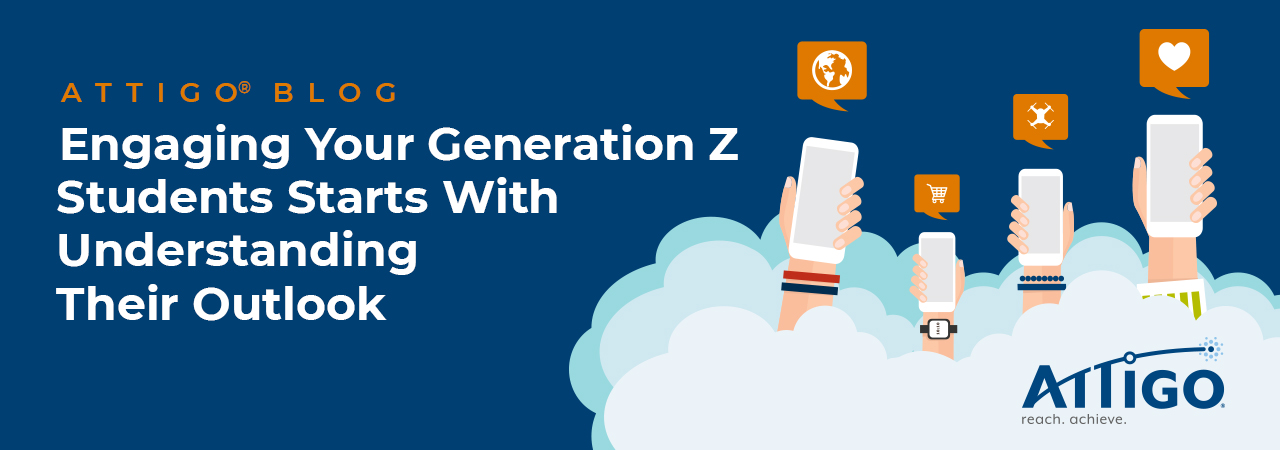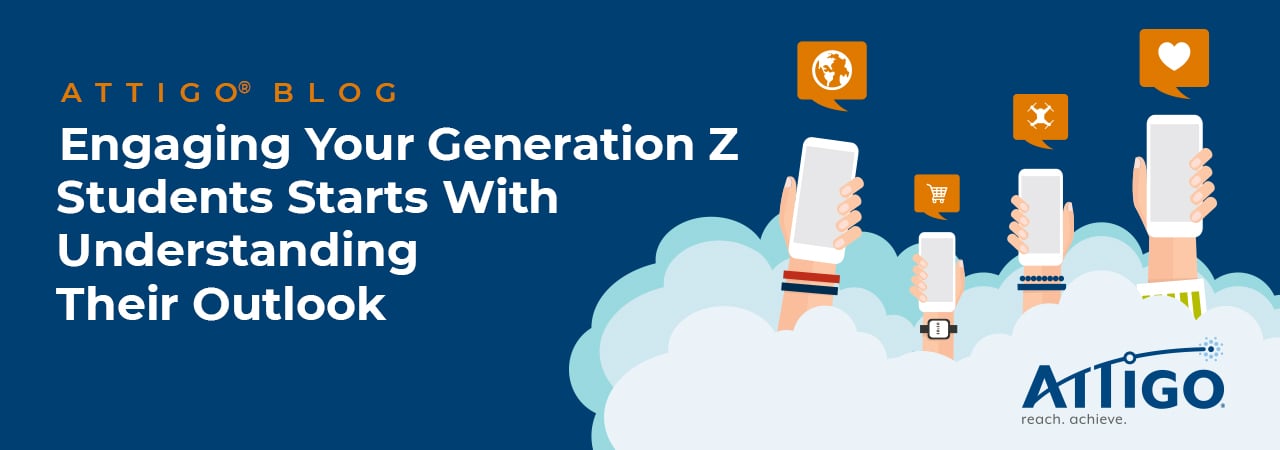Engaging Gen-Z Students Starts with Understanding Their Outlook

What is student engagement?
Thinking back to around 1995 when I was working in admissions at a state university in Kentucky— that’s the first time I heard the term “student engagement." During a meeting, we were developing strategies to reach the “younger” generation. In order to attract students to the university, we first needed to capture their attention. Technology was beginning to take off (like I would have never imagined). The World Wide Web had launched a few years prior and with the inception of AOL shortly afterwards, we were soon getting email accounts at the university. More and more families were now online so the topic of discussion was—how do we use this new technology to attract and “engage” students? Fast forward almost 25 years later, this is still a topic of discussion at many colleges and universities across the country.


The concept of student engagement can be described several ways. When I first heard the term during that meeting in 1995, it was defined as the level of interest or “connectedness” a student had. We discussed how engagement increased connectedness which increased matriculation which improved retention. While this definition still holds true, the concept has expanded as more research has revealed the correlation between engagement and learning. There are several detailed and complex definitions of student engagement but simply put, it’s the degree of interest and willingness that students show when they’re learning. When students are motivated or involved, their level of engagement increases and thus, learning improves. When they’re bored or dispassionate (or don’t care), engagement declines and so does learning. The bottom line—students who are interested tend to learn more.
Millennials Versus Generation Z
Today’s students are vastly different than the ones we were trying to reach in 1995. The rapid speed of technology has forced all of us born during the time of landlines, cassette tapes, and typewriters to quickly get on board. The last decade was spent dissecting and researching Millennials because they were the largest generation and were extremely different from the previous generations. They drew a tremendous amount of attention because of their diversity, tech-savviness, and strong desire for teamwork and collaboration. They were also labeled with some not-so-positive attributes such as selfish, entitled, and lazy—which is why they were also titled the “Me Me Me” generation. Millennials still make up a significant part of the population at most schools—their ages range from 23-38. But it’s the next cohort that requires our focus and attention…Generation Z.

Gen Zs, whose ages range from 16-22, are true digital natives. The term was first applied to Millennials (they were also called the Net Generation), however many of them were teenagers when the first iPhone was introduced. For Gen Zs, phones have always been “smart” and videos have always “streamed”. In a recent article in the Global News, it said, “Gen Zers are not addicted to technology, it’s an extension of themselves. Are you addicted to your right arm?” This reminds me of an incident a few years ago when my boys were around 10 and 11 years old. I left them at home alone while I attended a homeowner association meeting a few houses down from ours. I gave them explicit instructions, including to call me in case of an emergency. During the meeting, my phone rang and I saw my son’s photo pop up. Panic set in immediately. Is the house on fire? Is someone hurt? I stepped outside to take the call. I asked, “Is everything ok?” and my son replied “No, we have an emergency”. My panic intensified. “What’s wrong?” and he replied, “The Wi-Fi is down”.
Key Characteristics of Generation Z
 They are masters at multitasking. While most people can’t take in and absorb too many streams of information at one time, Gen Zers seem to be able to. I guess this explains why my teenagers can study while listening to music through their earbuds and watching a video on YouTube.
They are masters at multitasking. While most people can’t take in and absorb too many streams of information at one time, Gen Zers seem to be able to. I guess this explains why my teenagers can study while listening to music through their earbuds and watching a video on YouTube.
What’s incredibly interesting about this generation, in addition to their high technology skills and multi-tasking abilities, is their level of independence and financial outlook. Most studies on Gen Zers indicate they have a practical approach to money. The Center for Generational Kinetics produced a white paper titled, The State of Gen Z 2017: Meet the Throwback Generation. Here are some surprising discoveries of this newer generation:
- 77% earn their own spending money
- 85% watched at least one online video this past week to learn a new skill
- 1 in 5 say debt should be avoided at all cost
- 24% say they will pay for college through personal savings
- 48% have a banking app on their phones
- 12% are already saving for retirement
 These statistics and several other studies reveal that Gen Zers have a more practical mindset when it comes to their finances. Many want to work, save money, and avoid debt. They tend to seek more independence and autonomy and have stronger entrepreneurial skills. They fear taking on debt for education and some will live at home or commute to save on living expenses. Part of their views and outlook on money stems from watching and hearing about the life experiences of Millennials. Many of them entered the workforce with higher debt during bleak economic conditions. Gen Zers do not want history to repeat itself.
These statistics and several other studies reveal that Gen Zers have a more practical mindset when it comes to their finances. Many want to work, save money, and avoid debt. They tend to seek more independence and autonomy and have stronger entrepreneurial skills. They fear taking on debt for education and some will live at home or commute to save on living expenses. Part of their views and outlook on money stems from watching and hearing about the life experiences of Millennials. Many of them entered the workforce with higher debt during bleak economic conditions. Gen Zers do not want history to repeat itself.
Stepping Stone to Improving Outcomes
Let’s go back to the concept of student engagement. It can be enhanced when you thoroughly understand the audience you’re attempting to reach. Knowing your students for the purpose of increasing engagement may require you to “dig a bit deeper”. Your incoming and many current students are Gen Zers and, as I described above, they have different life experiences, views, and expectations. Use what you know about this generation to develop engagement strategies that will stimulate and inspire them to learn. The old adage says, “Once a generation is understood, you become more aware of the outcomes anticipated by each generation.”
Questions?
Don’t hesitate to reach out!



